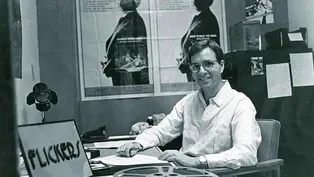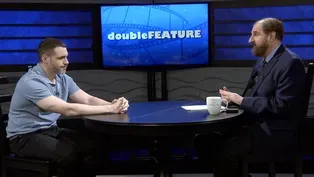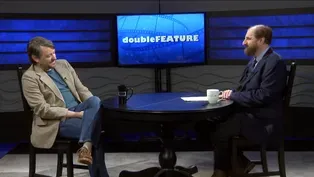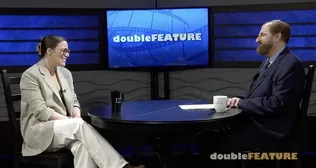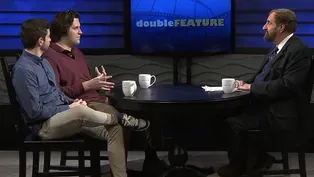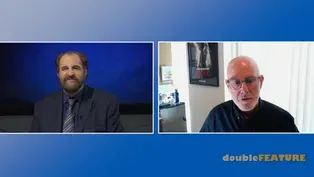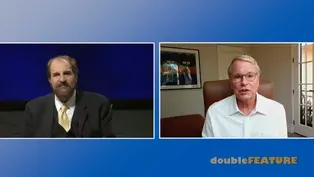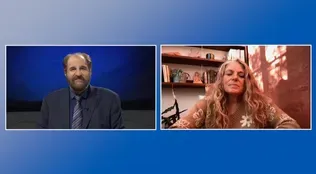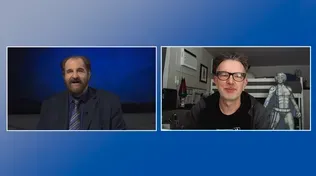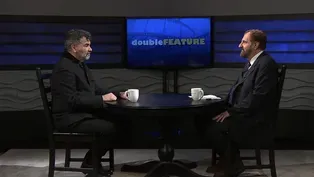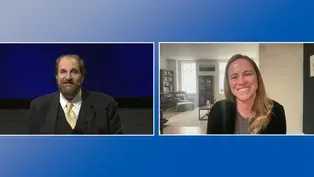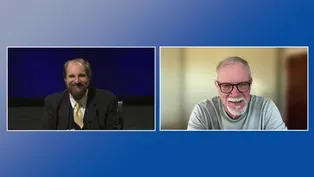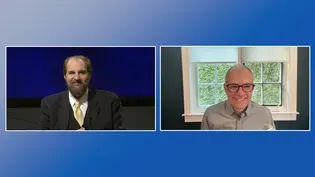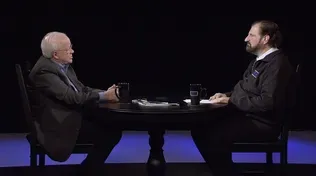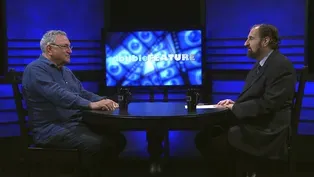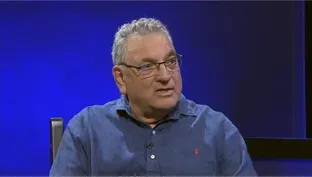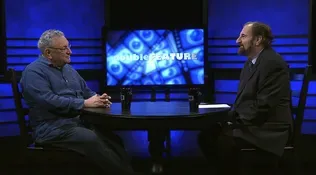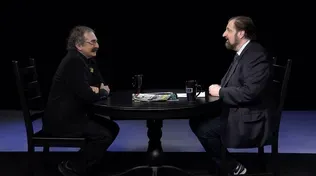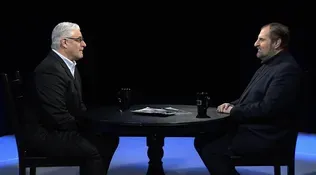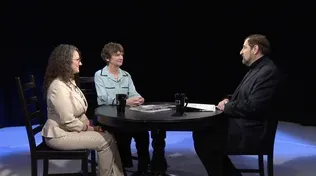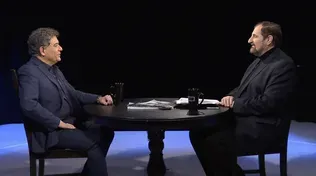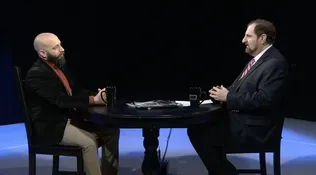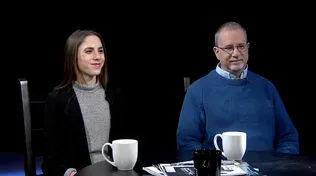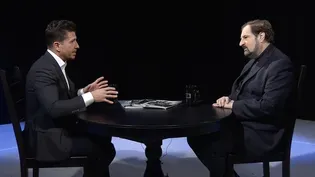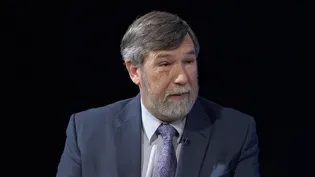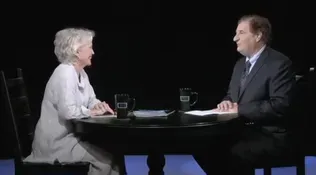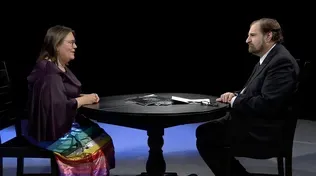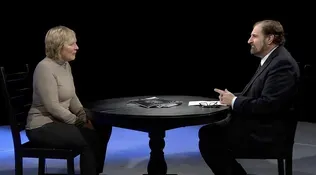
Interview with Elyse Katz
Clip | 49m 15sVideo has Closed Captions
Steven Feinberg interviews award-winning filmmaker, Elyse Katz.
Steven Feinberg interviews award-winning documentary filmmaker, Elyse Katz whose first film, "Last Days," was produced by Steven Spielberg and won Best Documentary Film at the 1998 Oscar Awards.
Problems with Closed Captions? Closed Captioning Feedback
Problems with Closed Captions? Closed Captioning Feedback
doubleFEATURE is a local public television program presented by Rhode Island PBS

Interview with Elyse Katz
Clip | 49m 15sVideo has Closed Captions
Steven Feinberg interviews award-winning documentary filmmaker, Elyse Katz whose first film, "Last Days," was produced by Steven Spielberg and won Best Documentary Film at the 1998 Oscar Awards.
Problems with Closed Captions? Closed Captioning Feedback
How to Watch doubleFEATURE
doubleFEATURE is available to stream on pbs.org and the free PBS App, available on iPhone, Apple TV, Android TV, Android smartphones, Amazon Fire TV, Amazon Fire Tablet, Roku, Samsung Smart TV, and Vizio.
(bright music) - Hi, I'm Steven Feinberg, Executive Director of the Rhode Island Film and Television Office.
Our guest tonight is a phenomenal filmmaker.
She primarily does social justice documentaries, and she's won multiple awards for her work.
I wanna welcome my wonderful friend, Elyse Katz, who's coming in from Santa Monica, California.
Thank you for getting up so early, and welcome to "Double Feature".
- Thank you, Steven.
Lovely to be here.
- So Elyse, you grew up in Cranston, Rhode Island.
You went to George Washington University, you went to Syracuse University, and you then went to New York, correct?
- Yes, after GW, went to New York for five years.
- And what were you doing in New York?
- I established myself in various film-related venues and jobs.
I did everything from extra casting, I worked in music, music managers, and I also did production assistant, which really started my on my career going towards filmmaking.
- Right.
And did you know that you wanted to be a filmmaker when you were in Rhode Island growing up, or was that something that you decided, or that you got attracted to, maybe in college and in university?
- Yeah, I think what really highlighted my interest in the arts, it was more theater and the arts, but I went to Syracuse to study politics, but I took a theater course, an acting course.
And then I transferred to GW, and during that summer, I worked on Capitol Hill as an intern.
- Right.
- In Senator Claiborne Pell's office, actually.
And when I worked on Capitol Hill, and I got to see all the ins and outs, really fascinating stuff, but I just didn't feel it was right for me to continue going into politics, or legal area.
So I switched my majors, and at GW, I studied the arts, management of the arts, business of the arts, I did a lot of internships.
It was a great opportunity to work in different fields.
And then I went to New York, and continued that, and I had an opportunity to explore a lot of possible areas of interest, but once I got into New York, and then I started working as a production assistant in the film business and locations, actually, I knew that I wanted to go west and get more serious, and get more involved in filmmaking.
- And you are a West Coast girl, too.
I mean, you love West Coast, right?
- (laughing) I do.
I like the warm weather.
I like the ocean, so I'm still in the ocean, near the ocean.
- You walk the beach every day, right?
- I go a lot.
I will go Friday, which is tomorrow.
Friday.
You know, I take my dogs there.
I live near the water, so it's really great- - Right.
- To be close to the water.
So yeah, I love the things that California offers.
Space is one of them.
I love that.
- I remember when we got reconnected, because we had gone to the same high school, a few years difference, but we got reconnected when you were in Los Angeles, and at that time, you were working with Deborah Hill, who was a producer, who worked on all the John Carpenter films, you know, "Halloween".
What was it like working for Deborah Hill?
- It was great.
I was able to go work with Deborah Hill when she had a deal with Disney, so I was working on the Disney lot.
Her partner was Linda Oakes.
They were two powerhouse women.
They were the women who helped break the ceiling, the glass ceiling, and give opportunities to more women.
And when I was there, they were finishing up a movie called "Heartbreak Hotel".
Not many people know that one.
But then they went on, or Deborah went on, to do "Big Top Pee-Wee", which I was her assistant, and I went with her, and we would film that movie on the Disney Ranch.
So imagine filming "Big Top Pee-Wee" on the Disney Ranch.
Can't get better than that.
- [Steven] Right.
- So that was a lot of fun.
So working with Deborah was great.
It was very interesting.
She taught me a lot.
She was a line producer.
She was the behind the scenes producer, and from her, I got a lot of insight on how to do things.
I was with her all the time working, so I was closely learning the ins and outs.
Linda Oakes was also another guided force.
So it's a really wonderful opportunity to- - You had mentors.
- Yeah, they were both mentors.
Yeah, they are mentors, yes.
The late Deborah Hill.
- Right.
- And from there, I knew I needed to keep going.
So I had an opportunity to work as an assistant production coordinator, and that opened the next level of where I was going.
- Tell us about it, tell us about it.
- Okay, so.
(laughing) So that movie, which started out to be "What About Bob", but it wasn't ready to film.
They couldn't cast it yet- - [Steven] This ends up being with Bill Murray and Richard Dreyfuss.
- Right, but they weren't cast yet, so they couldn't move that forward.
So and this again is at Disney.
So again, they moved us onto a movie called "3000", and that movie, which Garry Marshall was directing- (Steven singing soundtrack) The late, great Garry Marshall ended up becoming "Pretty Woman".
- Right.
And that was originally, right?
That was originally a darker script that got lightened up, right?
- Yes.
Yeah, that's why I call "3000", and they had rewrites, and they had to punch it up.
But we were on it from the beginning.
I was working with Roger Pugliese, one of also my mentors, who, him and I have done many films together, but it was a great opportunity.
So we were based in the Disney lot.
We filmed onstage partly in the Disney lot.
We also filmed locations that you know.
You know, it's that film is obviously gone on to more than anyone can imagine when we were filming it, but it was a lot of fun.
It was a great opportunity.
- How was it, did you spend any time with Garry Marshall, the director, who had done shows like previously "The Odd Couple", "Happy Days", "Laverne and Shirley", and then he started, I think his first film he did was, I forget the name of it.
It was with Matt Dillon.
"Flamingo Kid".
- "Flamingo Kid".
Love it, great film.
- Yes.
- Great film.
- And then- - Yeah, he's amazing.
It was a great opportunity to see him work, 'cause again, when they're filming close by, you could just go to set, sneak out, go to set.
I would always visit set.
I would always be a part of it.
Because my job was production coordinating or assistant.
So it was more office related at that time, but I would jump into whatever I could to be a participant, and that was a great group of people.
Lovely, he has a family of people that work with him.
In fact, the first A.D., she's actually, her name is Ellen Schwartz.
She's the one who gave me my first job in New York City, on the streets of New York City, so it came full circle.
It was a great opportunity to work with her again on "Pretty Woman", and still friends, of course.
And it just opened up a lot of opportunities.
From there, I went on to production coordinate.
I worked with Roger Pugliese again, and again.
We did great movies, like "Single White Female", we did "Higher Learning", worked with amazing talents.
And when you're doing production, you learn a lot of the ins and outs.
You're like the, you know, you're the liaison with set, you're the liaison with the studio, you're the liaison with the talent.
You're managing a lot of the day to day operating plans, materials, distribution, communication.
It's a great- - Every day is a different adventure, right?
- Yeah.
- Every day is a different adventure for you.
And were there particular aspects of all of that that you loved more than other parts?
And then on the other side, were there particular parts that you were like, "Ah, I wish I didn't have to "do this stuff"?
- I mean, in a day to day operation, there's the paperwork, that's a lot of paperwork.
That's the challenge also, it's gotta be done right, obviously, because it's distributed, and you gotta make sure everybody gets it.
That's tedious.
There's no doubt, that the paperwork.
I was a set person.
I enjoyed being involved in the action, helping in that way, so if I could work with talent, or I could work with the director, the shooting crew, that was where I thrived.
I really liked that, and that's kind of where I ended up, managing and working closely with the shooting crew, and working with directors, producers, and helping to fine tune the crew, the people who- - Coordinating in a way, production coordinating, right?
- Yeah, yeah well that's where I did go from there on, but then I went on to production supervise and line produce.
- Yeah.
- I went on to do independent films from studio films.
I worked with many different talents, which was always fun.
And worked with studios at the time, which was really a fantasy.
- Yeah, you said fantasy.
Is that what you just said?
- Yeah, I mean you're on the lot with history.
You know this.
You're a nostalgic guy.
You're like, where the ancestors, the people who started the industry walked, whether it was on Columbia Lot, on Paramount Lot, I worked on Warner Brothers Lot, I worked on Universal Lot.
I always, when I walk through those gates, I'm like a kid in a candy store.
It's like the most exciting thing to be able to make magic.
- You know, you just gave me goosebumps.
Because I would a lot of times when I was fortunate enough to have access to all the studios also, and a lot of times when I was writing, on my projects, and some of them were original scripts, or whatever, I was fortunate enough to be able to walk the lot, as I'm just trying to think, and you're always going to the cinema gods, because you know that the Columbia Lot was at one time the MGM Lot, or you'd go and walk on the 20th Century Lot, and the same thing with Paramount.
These are the places that, Warner Brothers.
They were the originals.
Disney, too.
So that's so exciting.
And then on the other side, when you said fantasy, I thought about the difference between an independent film where there's no money left, because how are we gonna get another $100,000 versus a studio, at least you know that there's a bank of money there, yeah, you might be running out from what they gave you, but you know that you're not having to go down the street and have a lunch or dinner to try to get another $100,000 from somebody.
- Yeah, no.
There's a huge difference.
My first independent film was called "Johns".
It was with Lukas Haas and David Arquette, and it went to Sundance.
And it was a wonderful experience, challenging.
We had all different types of cast.
It was great.
And Scott Silver directed it, well-known now director, writer.
And it was just on the streets of LA.
I mean, we literally filmed on the streets of LA, and got it accomplished, but it was just so- - Commando style, right?
It was commando style.
- Yeah.
It was definitely- - Guerrilla filmmaking, they call it.
- Yeah, guerrilla filmmaking.
I mean, we had great crew.
We had great talent.
We had enough money, I guess.
We made it work.
We had to.
Nobody got paid well.
I mean, we got paid enough.
It was, those were the days when you really reached deep down, and you make decisions according to what you can and cannot do.
You make negotiations according to what is possible.
That one was definitely like that, and really a joy to work on.
- Do you have a favorite film of the ones that you've, the narrative films?
And I'm not talking about your documentaries.
We're gonna go there next.
But out of the narrative films that you did, whether independent or studio, do you have a couple of favorites out of those?
- "Going All the Way" was a challenge.
That was a good one, but it was a challenge.
That one was filmed in Indianapolis.
- [Steven] Was that the one with Walter Matthau?
"Going All the Way"- - No, no.
Mark Pellington directed it.
It was with Ben Affleck and Jeremy Davies.
- [Steven] Oh, okay.
- That was before Ben was Ben.
People knew about Ben.
Ben was the star of it.
He was like a Burt Lancaster kind of young guy at the time.
And it was Dan Wakefield's novel, period piece.
Really wonderfully shot and beautifully done.
That was a tough one.
I was the production manager on that.
But it's a beautiful piece.
Mark Pellington just recently recut it.
- Oh, wow.
- And was showing it at a theater locally here, and in other places, I think it's being distributed.
Jill Clayburgh was in it.
So many all star casts in that one.
That was before Ben Affleck's Academy Award nomination, winning, for his writing of "Good Will Hunting".
- Right.
- So you can tell what date that was.
- Yup.
I just had the casting director yesterday.
She was in here, she cast Ben in his first project when he was eight.
- I mean, what a gift.
I mean, he was, that was a really, it was an interesting film to work on, obviously location base.
And to find all the period stuff in Indianapolis like nothing had changed, from Dan Wakefield's history, so it was really wonderful.
- What would be another one that you loved working on, or that you're proud of?
- Independently?
- It doesn't, or studio.
- Yeah, I mean, when we talk about, well, "Pretty Woman", obviously.
"Single White Female" was probably a favorite one of mine.
We shot that in a studio, 90% of it.
Some of it was shot in New York also.
But predominantly, the apartment was built at a studio across the lot from Paramount, and we had a great crew, and Barbet Schroeder directed that, and that was a treat to work with him.
He's got a long history of very interesting stuff.
- "Kiss of the Spider Woman", I think Barbet Schroeder- - Yeah, he's Barbet Schroeder, so he's done, what was the other one he did?
Very interesting talent.
- Right.
- Milena Canonero was also a part of that.
She's a very interesting talent.
She did the design and the costumes, and working with both Jennifer Jason Leigh, and Bridget Fonda, that was a treat.
- Right.
- That's a really creative movie.
- Right.
- All the things we did with that.
So that was a favorite, 'cause we worked, and we shot right next to each other, so we were all together, and it was really, again, a studio back, so it was fun to work on.
No problems with- - And that was a thriller.
And that was Bridget Fonda, I think, was really, she had, was really starting to make a mark for herself, a name for herself at that time.
Let's jump into your prolific award-winning social justice documentaries, which is really interesting, because you talked about working in DC, and interning there, and having an attraction to government, and social issues, and then moving, and then your love for film, and you combine them.
You made magic with both of those ingredients.
Can we talk about one of your first documentaries, and how you got involved in that?
- So while I was at Disney, I also worked with other, there were other assistants there.
James Moll was an assistant of Francis Veber.
June Beallor was assistant to Lauren Shuler Donner, so we became good friends.
When Steven Spielberg had come back, or was filming "Schindler's List", a lot of the survivors came up to him and said to him, "We wanna tell our story.
"How do we tell our story?
"We wanna get our story out there."
So Steven sat down with a group of people, and they created the Shoah Foundation.
The Shoah Foundation was eyewitness testimony of the Holocaust at the time, any Holocaust is what they've been doing, but at the time, it was predominantly the Holocaust.
So when they started, they had done a lot of different testimonies.
They've done over 600, or over thousands of testimonies.
When they started to do films, one of the films that they wanted to do, June Beallor and James Moll got involved, they were the producer and director of.
So they turned to me, we were friends, I had been doing a lot of different line producing.
And they wanted someone to help them make it.
So we were able to team up.
It was a wonderful team.
We also had another graduate from USC- - Harris Done.
- Harris Done, who you know.
- Classmate, yup.
- Join us, and we teamed up to make this unique film called "The Last Days", and we worked at the Backlot of Universal in trailers to do a lot of the research, and gain all the information, because it is a very heavy handed film.
We had to do it right.
We had to make the decisions of who is the right- - Heavy lifting, not heavy handed, but heavy lifting.
- Yeah, heavy lifting.
Because again, it was focused on the Hungarian experience.
It was called "The Last Day" because it was focused on the last days of the war.
So with that, we focused on five Hungarian survivors, and the plan was to go with them and their family member back to their roots.
So we found five unique stories.
Four of the stories we filmed in our initial pass, and then one we filmed on the second pass.
But I was the one who went with them back to their homeland.
I was able to travel to Poland.
We went to Auschwitz, and in Auschwitz, that was obviously the most unique experience.
None of us had, you know, we have an education about the Holocaust, but until we're there, we don't really know what we're doing, and the way we were there was we really dove deep into the archives.
We went with survivors.
They had their stories to tell.
We found, while we were there, in the archives some unique information about Renee Firestone, one of the survivors, and we were able to continue her story beyond what we had planned.
You just never know with documentaries, one door opens, and another, you walk in, and you don't know where you're going, and other things happen and develop.
So it was hard.
It was a very difficult shoot- - Emotionally.
- To be there, to go and film it.
I recommend, it's a highly educational piece.
I recommend watching "The Last Days".
It is available.
And so from there, we went, we kept going.
But it was, again, as you said, it's an impact on you personally, as well.
But we continued that throughout, we went to Hungary.
I went to Uzhhorod.
Uzhhorod is the Ukraine.
Other groups went to Germany.
And it was definitely a life-changing experience.
- And it was really important, I know, because when Steven Spielberg was approached by a lot of the people while he was filming, I wanna tell my story, how can I tell my story, how can I tell my story?
And unfortunately, as time goes on, these people begin to pass away.
So they're the last living testimony, testament to the horrors of genocide.
- They are.
Yeah, they are.
And they're really important to get.
- So that's why it's very important to video, and collect those interviews, and I think he would use the word, it's a mitzvah, to do that.
But you guys have done that.
And I know the Shoah Foundation has gone, not just with the Holocaust, or the 1940s, and that genocide, but other genocidal atrocities across the world as well, and they're continuing the work.
And you guys won awards for this unbelievable, powerful "Last Days" film?
- [Elyse] Right.
We won the ultimate award.
"The Last Days" in 1998 won the Best Documentary Feature Film.
So, very exciting- - From the Academy?
- Highlight of my career.
My first documentary, just starting on the highest of highs.
- Mm-hmm.
- Where do you go from there, kinda thing.
But it's still, it's the biggest pride of my life.
There's posters in my family, my mother's house, there's posters in my sister's house.
It's a beautiful legacy to have.
I'm really happy.
- Well-deserved, and I'll tell you something else, having worked with you on a documentary.
They chose the right person to be a part of the team, and it's a team of all stars, and you were part of that team of all stars, and you made something that will stand the test of time, which is, how cool is that?
- Thank you so much, Steven.
- How cool is that?
- Thank you for that.
You know, I did go to Yad Vashem.
We were in, my husband and I went on a trip to Israel, and in Yad Vashem, the poster is hanging in the archives there.
- Wow.
- And it's pretty, that's pretty amazing.
So I'm very proud of that accomplishment, yeah.
- Now what happened after you did that, and I'm sure you're on cloud nine.
What did you do after that?
What was the next passion project for you?
- Well, the thing about documentaries, they do take time, usually, unless you have the support of a foundation behind you.
As I look back at all my documentaries, and I'm looking back now as we think, there's so many that I'm proud of- - "Last Days", well you did "Trudell".
So talk about- - Yeah, so that was the next one.
So when I, I was introduced to Heather Rae, really important person in my career also.
And her and I teamed up.
She had already started filming years in collaboration with John Trudell.
John Trudell, a very unique individual.
Was part of the American Indian movement, was part of the group that took over Alcarez, Alcatraz, in the late 60s, for sovereignty, fighting for their sovereignty.
So it was a great opportunity to be able to tell his story.
So that was a beautiful piece, hard piece.
He went through a lot of hardships.
- Tell us why, what was the hardship?
What was his, what was the battle for him?
- Yeah, he was a spokesperson when they were at Alcatraz.
He was a very prolific speaker, he was charismatic.
And so he would be, he would be the one most people heard about the causes, what was going on.
So it was hard for the government to hear, they were going up against the American Indian movement.
The American Indian movement was considered volatile at times, and so there was a lot of conflict going on on reservations with the government and local authorities, and they were fighting for their sovereignty.
And it became a heavy handed clash.
He was considered by the FBI, he had a heavy dossier with the FBI.
He was considered a threat.
A suspicious fire happened in his home in Duck Valley while he was in Washington, at the FBI's stairs at the Hoover Building, protesting, and it was tragic, a family fire that took his wife, his unborn child, his kids, and his mother-in-law.
It was very tragic.
And it's a testament to him, how he was able to move beyond that, but it was something no one should ever go through.
It's also, no one ever came out, no solid proof came out as to- - No one was held responsible, is what you're trying, I think.
- Yeah, I mean it was a suspicious fire, and even though the government said it wasn't suspicious, there was proof that it was suspicious.
So that was an important film.
- I was gonna say- - That went to Sundance, and it was in the competition at Sundance.
- And I think you and I again got reunited at the Newport Film Festival for that.
- Right, correct.
But that went to the Newport Film Festival, and that year, they were honoring Claiborne Pell, and he was advanced in age, and he was there with Nuala.
And it was a great opportunity to see them.
And I went and reintroduced myself to them, 'cause I had been to their home in Washington when they would always open their home when you were a student from Rhode Island.
You know, I was a student there.
They would have their little barbecue, so I had met them a few times.
I had obviously worked in Senator Pell's office.
So I reintroduced myself to her, to Nuala, specifically, and told her that I wanted to do a documentary about Claiborne Pell.
And he was advancing- - I think I introduced you to Clay at that time, also, their grandson.
- Yeah, so she said, "Great."
And we reconnected, we connected, and then she said, "I'll introduce you to my grandson."
So she introduced me to Clay Pell, and so that's how the film, our film, about Pell started.
And it wasn't until he passed that we really started working on it, and Clay, I had sent a note to Clay when Senator Pell had passed, and I said, "Obviously I'm very sorry for this loss, "huge loss, but I think now is the time "that we should start doing this documentary."
So he agreed.
I think he was in law school then.
So I started.
I said to him, "I know exactly who I want to direct this."
And I said the right person, and I approached you, we approached you.
You had known Clay.
You knew his family.
You and I had known each other also.
It was a perfect fit.
And we started our quest to get the film made.
- And it was an honor, I remember being honored one time having dinner with the Pells at their home, and I was so glad, giddy, I was giddy.
I remember going home, and thinking Randy Rosenbaum, who had hired me from my job, and saying the fact that I get to have dinner with the Pell family was one of my life highlights, because I remembered him when I was six, or seven, or eight years old at Narragansett Beach, and he was out there shaking hands, and my parents had said, "That's our senator.
"That's Senator Pell.
"That's our senator."
And I remembered that day.
So it was an honor working with you and Clay.
Clay kinda stepped away, because he didn't want to influence the project, and I remember you and I talking about Senator Pell being such a, his life, there's so much to talk about.
And I thought it was a smart move to just, let's focus on the Pell Grants, and then we'll be able to learn about him, and what inspired him to do these things, and so we focused on the Pell Grants, and learned a lot about his life, and, if you remember, on the very first day, we were interviewing some folks who had been instrumental in the Pell Grant program, and honestly, and this is a secret we can share with any documentary filmmaker, we were kind of going against a wall, it was like we weren't getting information.
I didn't know where that movie was gonna go.
And then we spoke to Dr. Wolanin.
- [Elyse] Tom Wolanin.
- Tom Wolanin.
And we weren't really getting much information, and I finally, exacerbated, I said, "Tell us a secret, Tom."
"Huh?"
"Tell us something we don't know."
I was just like throwing out something, and he responded, "Well, there was a clandestine meeting "in Senator Pell's secrete hideaway office "where we planned to overthrow the Senate."
And that was it.
And then we found our drama.
That was terrific.
How was that experience, and again, we didn't know exactly what the drama was going to be, but we found it that day.
How was that experience compared to working on "Trudell", or I know you did some of your other works.
How was that experience for you?
- Well, coming from Rhode Island, it was very personal.
Working with my friends, very personal, very fun.
Also it was our film.
I birthed it in that way, we birthed it.
I had the idea, and I pushed forward with it, followed up with Clay, followed up with the family, followed up with the research everywhere, everywhere we could go to get factual information, stuff from the archives down at the college.
Everywhere where we could really gather some insight into his contributions.
So it was a thrill to be able to do it.
I think it was- - You know you did not- - Talk about highlights, that's another one of my highlights.
- You know what you did, and I don't think I've shared this with you before, but I wanna make sure I do.
'Cause I'm thinking about it now.
You really, you were so, you're a phenomenal producer.
You're so hardworking, and you kept the ball rolling.
But I just realized something that you did.
Like, let's say I was the chef, right?
Because I had to figure out as the director.
What you did as the restaurant owner, let's say.
You gave me every ingredient that I could want, like you said, "Here's somebody you need to meet, "here's somebody we need to introduce."
And whether we used it or not, you provided all of these ingredients that I didn't even know existed, and gave us, and planned everything out, whether we were gonna, like, we met some phenomenal people in Washington D.C., and we traveled, and then we met a group of students, and what their needs were, and they each had individual stories about how Pell Grants changed their life.
One young man, his parents, he was birthed, but I don't know if he really had them as parents, and one was in jail all the time, and the other was a prostitute, and he was trying to break the cycle, and the Pell Grants helped him to break a cycle that he had been in.
And another person was a first generation Asian-American, and another person poor, and how it changed their lives.
But you were the motivating, you kept the ball rolling.
You kept us getting, again, you provided, you really produced, and I cannot let the audience know how much and how outstanding you were as a producer on that movie.
And it was an honor to work with you on that.
- That's very heartfelt.
It's beautiful.
Thank you for that.
I have that energy, I do.
I've always had it, I still have it.
I'm passionate.
I guess it's just the passion.
You know, and relentless.
And I use it in everything I do.
So one of the things that's funny now is my husband and I, one of the connections is I speed him up, he slows me down.
(Steven laughing) So it's a balance, the way you can offset some of it.
But I still have the passion and the interest to make quality films.
And I think it's really important.
That was an amazing experience.
It still is.
I still, you know, going through files, I found an amazing group of pictures just recently.
It's really wonderful.
Thank you for- - And we were able, not only to have special screenings here, sold out screenings in Rhode Island, we won awards in Rhode Island, we won award in Los Angeles, in New York.
And we were able to show the film at Congress, and that was a special thing to be able to- - That was with the Rhode Island Delegation.
It was amazing.
- Right, the Rhode Island Delegation in Washington, D.C. That was really neat.
What about one of your newer movies, "Chaos and Hope".
Can you talk about that?
- So in 2020, obviously it was a troubled year for everyone.
And what June Beallor again, my friend from Disney days, my colleague, my producer on "The Last Days", she was approached to do this film about the year 2020.
So again, we teamed up.
I've teamed up with her many times.
And we basically, during the pandemic, basically.
We found the story, she found the story, with a group of wonderful filmmakers, wonderful teammates.
We did it mostly remote.
Everybody was home, or even the editors were home.
And we gathered, it's "2020 Chaos and Hope" is what it's called.
It's available on Peacock.
Anyone can see it.
I'm very proud of it.
It's a wonderful piece of journalistic reality, understanding, and looking clearly at that year and what it meant to us, and what it did to us, but what we were able to do, also.
How to survive.
It's wonderful eyewitnesses, people also writing about it, reviewing about it, scholars.
It's a personal story for a lot of people.
And we're very proud to have it on Peacock.
Because you know, when you do a documentary, having it on a distribution platform is one of the biggest challenges, and one of the biggest triumphs.
I mean, obviously the Shoah Foundation, "Last Days" got a leg up from being involved with the Shoah Foundation.
But the others have to fight for how they get out there, how they get seen, who ges support for them.
This one, we're very fortunate.
We had support.
Our producer was very supportive.
Also June is amazing.
She directed it, she produced it.
And now you can see it.
And so can so many other people, which is the biggest triumph is in getting it out to distribution.
- Do you find that streaming has totally revolutionized opportunities for documentaries, right?
That hadn't been there five, 10 years ago?
- Yes, because I think it also, people are really watching documentaries, too.
I mean, you're learning so much about different stories that you would never have access to, you'd never see.
I mean, this year, stories that are coming up at the Academy Awards will be amazing, too, and they already are.
You know, I've watched many of them.
It's very, you're proud that you're able to tell these stories.
You're proud to share them.
Yeah, this is how you kind of get it out there.
Another one of my docs that I'm proud of is "Who Bombed Judi Bari".
- [Steven] Right.
Talk about that, please.
- That's an incredible piece, too.
That was in Northern California.
Two activists fighting to save the California redwoods.
Judi Bari and Darryl Cherney.
They were like troubadours.
They would travel out there trying to get their message out about clear cutting is wrong, you have to do it sustainably.
And they would use their music to do that.
So a suspicious bomb was planted in their car, and in 2000, yeah, I think it's, it blew up.
She was injured.
He was able to walk away, but she had to go through therapy, and rehabilitation.
And they never found out who- - [Steven] Bombed their car.
- Actually planted the bomb.
Although in our film, we have said exactly who planted the bomb, because we have all the proof, and they didn't go after it, so it's a very interesting Northern California story about the business of logging, sustainable logging, and about environmentalism.
Very proud of that one, too.
So it's called "Who Bombed Judi Bari".
You can also see that, a lot of the films, again, because it's streaming, and obviously YouTube and everything, you can Google them, and you can get them at home.
You can watch them for free.
- Maybe what we can do is show some of these films on "Double Feature".
How long is the "Who Bombed Judi Bari"?
How long is that film?
- Probably 90 minutes.
- Okay.
- Most of them are 90.
I know you have a limit, yeah.
Most of them are 90.
Yes.
- But we might be able to break them up into two parts as a possibility.
- Yeah, that would be good.
That's a really good film to share.
That and "Trudell", I think, too, to share with the public.
And I've currently got a couple more I'm working on.
- Anything you can share?
- Not exactly.
I have a call after we do this.
- Okay.
- With one.
One we're trying to get funding for.
I think we're close to get going.
It's a journalistic also reveal, that I'm partnering with Heather Rae again, who I did "Trudell" with.
Partnering with a journalist out of Canada that, a really interesting woman.
I do a lot of my stuff with women.
I've done a lot of my work with women filmmakers.
I support women directors.
I had a meeting the other day with one other woman director that I love to work with.
I've done one of her films.
We did a short together.
And you know, and working with June, obviously.
I work with her all the time.
Heather Rae, I work with at times.
- And you've been doing some other stuff, too.
We should let the audience know that you've been doing, I'll get a call from you, and you say, "Hey, I'm working with David Letterman "on a project."
- You gotta fill in the blanks with other work.
- Right.
- Because I've been freelance a lot of my career.
Yeah, I did the fourth year of the series that David Letterman, "My Next Guest Needs No Introduction".
We interviewed Billie Eilish, was the first one.
That was lovely.
That was really fun.
From "Seinfeld", Julia Louis-Dreyfus.
- [Steven] Julia Louis-Dreyfus, yup.
- We did her, we did Will Smith, before- - The slap?
- The Academy Awards, we interviewed him.
- And you've also been doing, so you've been doing all the David Letterman, because you'll say, "Hey, it's top secret, "but we're doing that."
And then you also, you've been working on an event for Universal Studios, right?
Those big events.
- What it is is the Backlot Tour content.
So we've done pieces for Warner Brothers and Universal.
We actually have a couple, some of the pieces I work with, Planet C Studios.
One of also my favorite people, Michael Carone.
So I had an office, this was when I loved living and working at Warner Brothers Lot, I had an office at Warner Brothers, I had an office at Universal.
That was so much fun.
And one of the things we did with the Universal project was something that is in Beijing at the Universal Studio tours in Beijing, and what it was, it's called, it's with Steven Spielberg and Zhang Yimou.
And what we did, it's called "Lights, Camera, Action" and we filmed it on the Universal Lot, and we built the Great Wall of China, and we did the story of magic, what can happen on the stage, what magic can happen.
And it's part of the tour, that when you go to the Universal in Beijing, it's one of the tours that they have there.
It's called "Lights, Camera, Action".
And it was really fun to work with both of them.
That was a great experience.
I also did one for "Transformers".
So yeah, we did another piece for "Transformers" that is showing also in Beijing.
And then at Warner Brothers, we did a couple things for the tour as well, and I still work with Michael Carone.
One of the things we did for the tour was they opened up the Backlot tour for Halloween, and we were able to be the producers of the Halloween tour event.
So it was really quite magical to make, you know, one of the fun of working with studios is their IPs, so the legacy, what they've carried in their IPs, which is intellectual properties, that they carry in their archives, so you get to work with that because they own it, and you don't have to get permission.
- So you're talking about like "The Shining", things like that, right?
- Yeah, yeah, yeah.
- It's Warner Brothers.
- Yeah, so we were able to do "Batman" stuff, and things like that.
And little things like that.
And in the Halloween tour, we made scary houses, and it was so much fun to live out your childhood, and fun things, and doing stuff like that.
That's what's so exciting about working in this business, that you just, you just never know what's next.
- Right, so your life is an adventure, Elyse.
- It is an adventure.
I gotta tell you about my last thing I just did.
- Go ahead.
- With Michael Carone, for Planet C, outside of anybody else.
He was hired to do a round table conversation with very technical people, as well as talent, for the last, for the launch of Kiss.
Kiss is now no longer gonna be touring, and what Kiss is now doing is they've worked with ILM and Pophouse, and they've become avatars.
So their music is gonna live forever in a 3D form.
They were motion captured on the volume stage, down south from here, and we were able to film on that stage with the icons who helped make this possible.
Pophouse came, Thierry Coup, who is a renowned contributor to Universal, and very creative ideas and making of the Backlot tours in "Harry Potter".
He's now creatively involved with them, as well as we had ILM with us, so we had all of them, we were able to film on the volume stage.
A round table discussion, conversation, that Michael Carone directed, I produced with him, with Gene Simmons and Paul Stanley.
- Yeah, okay.
- And you can see that on the internet now as well.
It's a 30 minute piece.
We're very proud of that.
That was really enlightening of their career, where they're going from now on, how they're launching this new adventure.
And you'll be able to capture this very soon of them in this form.
It's all the technical stuff now that they're working on, but it's kinda like Pophouse is known for doing what is in London for ABBA.
Pophouse is out of Sweden, and they have ABBA's live music, experiences, in a surround sound, or a 3D capture.
And this is kind of where the entertainment, some entertainment experience is when you go traveling, and you wanna have the legacy of music around you is where it's going.
- Immersive.
Immersive.
I know that they had their, quote unquote, last concert, and then they put a question mark, and they had said that they're going, the band will live on, and I could see having some kind of Kiss concert in the Sphere that is basically what you're talking about, taking all that work and creating an environment, an immersive environment.
- Correct.
They announced it at their last show at Madison Square Garden in December.
- Right, right.
Right.
- That's where they showed a bit of pieces from this piece, and then marketing took over to let people know about it.
But it was a lot of fun.
It's very current.
It's exciting to still do great things like that.
- So you're doing stuff for the future, and stuff for the past, and stuff for the present.
And Elyse, I just wanna say thank you so very much for your hard work, your passion, your enthusiasm, for educating society and audiences across the world with these passion stories that are important.
They're really important.
You're leaving a beautiful legacy behind while at the same time, you're having fun doing event projects as well.
And we can't wait to see what comes up next, and I wanna thank you also for being a wonderful friend, and I look forward to having you showcase your next film here in Rhode Island on the big screen.
- That'd be great.
Thank you so much, Steven.
This has been a joy.
I really appreciate it.
It's always good to do things for my hometown.
It has such a special place in my heart.
My mom still lives there, and I love going home.
So thank you so much.
- Thank you for taking the time out of your busy schedule, and enjoy the beaches of Santa Monica.
- Will do.
You enjoy the snow in Rhode Island.
- (laughing) All right, will do.
Thanks Elyse.
- All right, take care.
- Bye-bye.
(soft music) (soft music continues) (soft music continues)
The Legacy of George T. Marshall
Video has Closed Captions
Clip | 44m 58s | Remembering the founder of Flickers, George T. Marshall. (44m 58s)
Video has Closed Captions
Clip | 44m 59s | Steven Feinberg interviews director, writer, and actor, Tom DeNucci. (44m 59s)
Video has Closed Captions
Clip | 45m 2s | Interview with Alex Berard. (45m 2s)
Video has Closed Captions
Clip | 44m 59s | Steven Feinberg interviews First AD, Emma Barber. (44m 59s)
Interview with Chad Verdi Jr. and Paul Luba
Video has Closed Captions
Clip | 45m 31s | DoubleFeature shows films from around the world and takes viewers behind the scenes. (45m 31s)
Video has Closed Captions
Clip | 41m 15s | DoubleFeature shows films from around the world and takes viewers behind the scenes. (41m 15s)
Interview with Angela Peri and Lisa Lobel
Video has Closed Captions
Clip | 45m 25s | Interview with Angela Peri and Lisa Lobel (45m 25s)
Video has Closed Captions
Clip | 45m 45s | Interview with Jerry Ketchem. (45m 45s)
Video has Closed Captions
Clip | 49m 15s | Steven Feinberg interviews award-winning filmmaker, Elyse Katz. (49m 15s)
Video has Closed Captions
Clip | 44m 30s | Steven Feinberg interviews storyboard artist, Martin L. Mercer. (44m 30s)
Video has Closed Captions
Clip | 45m 19s | Steven Feinberg interviews Providence Pictures' Gary Glassman. (45m 19s)
Video has Closed Captions
Clip | 40m 24s | Steven Feinberg interviews producer Erika Hampson. (40m 24s)
Video has Closed Captions
Clip | 41m 56s | Steven Feinberg interviews directer/producer Joe Johnston. (41m 56s)
Video has Closed Captions
Clip | 45m 29s | Steven Feinberg interviews producer David Crockett. (45m 29s)
Video has Closed Captions
Clip | 42m 44s | Steven Feinberg sits down to interview the late film director, Douglas Trumbull. (42m 44s)
Henry Bronchtein Interview Pt. 3
Video has Closed Captions
Clip | 15m 25s | Steven Feinberg interviews director, producer, and production manager Henry Bronchtein. (15m 25s)
Henry Bronchtein Interview Pt. 2
Video has Closed Captions
Clip | 14m 51s | Steven Feinberg interviews director, producer, and production manager Henry Bronchtein. (14m 51s)
Henry Bronchtein Interview Pt. 1
Video has Closed Captions
Clip | 15m 33s | Steven Feinberg interviews director, producer, and production manager Henry Bronchtein. (15m 33s)
Video has Closed Captions
Clip | 37m 9s | Steven Feinberg sits down to interview producer and writer, Roger Lyons. (37m 9s)
Video has Closed Captions
Clip | 27m 31s | Steven Feinberg sits down to interview filmmaker Dante Bellini. (27m 31s)
Katie Reaves and Jennifer Jolicoeur Interview
Video has Closed Captions
Clip | 27m 7s | Interview with filmmaker Katie Reaves & Athena’s Home Novelties Pres. Jennifer Jolicoeur. (27m 7s)
Dr. Thomas Zorabedian Interview
Video has Closed Captions
Clip | 27m 6s | Steven Feinberg interviews professor and video producer/writer, Dr. Thomas Zorabedian. (27m 6s)
Video has Closed Captions
Clip | 26m 47s | Steven Feinberg sits down to interview picture editor Rob Schulbaum. (26m 47s)
Ron Bachman and Devin Karambelas Interview
Video has Closed Captions
Clip | 26m 45s | Steven Feinberg interviews Ron Bachman and Devin Karambelas from WGBH in Boston. (26m 45s)
Video has Closed Captions
Clip | 26m 15s | Steven Feinberg sits down to interview filmmaker Eric Latek. (26m 15s)
Video has Closed Captions
Clip | 26m 51s | Steven Feinberg sits down to interview host of Conducting Conversations, Mike Maino. (26m 51s)
Video has Closed Captions
Clip | 6m 34s | Steven Feinberg sits down to interview actress, producer, and screenwriter Marlyn Mason. (6m 34s)
Melissa Tantaquidgeon Zobel Interview
Video has Closed Captions
Clip | 16m 5s | Steven Feinberg sits down to interview author Melissa Tantaquidgeon Zobel. (16m 5s)
Video has Closed Captions
Clip | 26m 51s | Steven Feinberg sits down to interview director Alexia Kosmidor. (26m 51s)
Providing Support for PBS.org
Learn Moreabout PBS online sponsorshipSupport for PBS provided by:
doubleFEATURE is a local public television program presented by Rhode Island PBS
